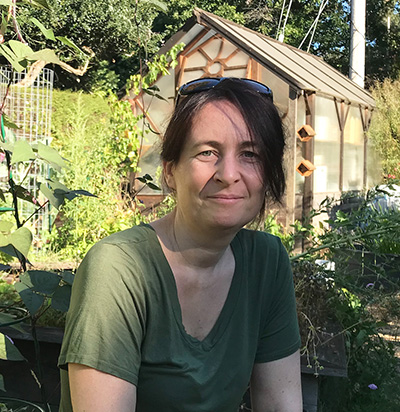Campus News
Building community connections and STEM identity with science in the garden
A pilot program funded by the Packard Foundation brings science into the home environment through gardening.

Screenshot
Alexie Leauthaud, an associate professor of astronomy and astrophysics at UC Santa Cruz, decided to use her love of gardening instead of astrophysics for a program to promote diversity in science, technology, engineering, and mathematics (STEM). She teamed up with Assistant Professor of Education Samuel Severance to develop the idea, and their proposal was awarded a $40,000 grant from the David and Lucile Packard Foundation.
Their “Seed Spoon Science” pilot program aims to improve outcomes for Latinx STEM majors at UC Santa Cruz and engage local school children and their families in science through gardening. The program will recruit ten Spanish-speaking undergraduates in STEM majors and pair them with ten local Spanish-speaking families with children in elementary school. The UCSC students and participating families will then develop a set of science projects for the children to carry out in the family’s home garden.
“The undergrads will serve as mentors and the kids will be practicing science in the home environment,” Leauthaud explained. “At the end of the year we’ll have a Harvest Festival where the kids will present their projects, we’ll have food from the gardens, and we’ll talk about what worked and what didn’t and how they solved the problems they encountered.”
One goal of the program is to build community and improve graduation rates for Latinx STEM majors. Serving as mentors for local children will help build their identity as scientists and increase their sense of belonging in STEM, Leauthaud said.
At the same time, the program will help build the next generation of STEM college students by nourishing an interest in science in the participating children and their parents and families. Early identification with science and scientists can have a large impact on decisions about whether or not to go to college, and what to study at college.
“Parents play a big role in setting career paths, and we hope this experience will help them see their kids as scientists and will help establish connections with UCSC,” Leauthaud said.
Severance emphasized the importance of working with the families as partners in the program. “We want to respect the expertise folks already have and the goals they have for what they want to do with their gardens and what problems they want to solve,” he said. “We’re there to support and work with the families.”
Gardening is often used as an accessible, unintimidating way to teach science. Leauthaud and Severance will partner with Santa Cruz-based Life Lab, which provides garden-based learning programs in schools across the country, to organize training workshops for the participants.
“We want to bring the Life Lab experience into the home setting to have more engagement with the parents and families,” Leauthaud explained. “It encourages the idea that everyone can be a scientist and that scientific principles are useful for everyday things.”
Leauthaud, who has a large home garden, said she often uses her science skills in the garden. “I’m always taking notes, doing experiments, and just using the basic principles of science to guide my decisions.”
The undergraduates will also produce a bilingual newsletter to go out every two months to participants in the program, covering themes related to science, gardening, and food, and including stories about experiments, problems encountered, and how they were solved. The newsletter will help students build STEM identity and improve writing skills, while helping to create a sense of community and highlighting the intersection of science and cultural practices.
The program will include extensive assessments, including interviews with all participants conducted by the Educational Partnership Center. The program will also conduct follow-up assessments of student success for the participating STEM majors.
Severance said he looks forward to studying the results of the program. “In trying to engage kids in science, it’s always a challenge to find something tangible that’s meaningful to them, and this project has a lot of good pieces we can study to learn how to make these kinds of experiences accessible and doable outside of school,” he said. “There’s a lot we can learn from this about how students develop a sense of identity as science learners, what the barriers are and how to navigate those, and what resources we might leverage to try to ensure these opportunities will be available for people in the future.”
Key partners in the program include Teresa McCaffrey at the Educational Partnership Center; Linnea Beckett at the Apprenticeship in Community-Engaged Research Program; STEM Diversity Programs Director Yulianna Ortega; Elif Demir Hilton in the Office of Research; Judit Camacho, co-executive director of Life Lab; Cal Teach Director Gretchen Andreasen; and Professor of Literature Juan Poblete.